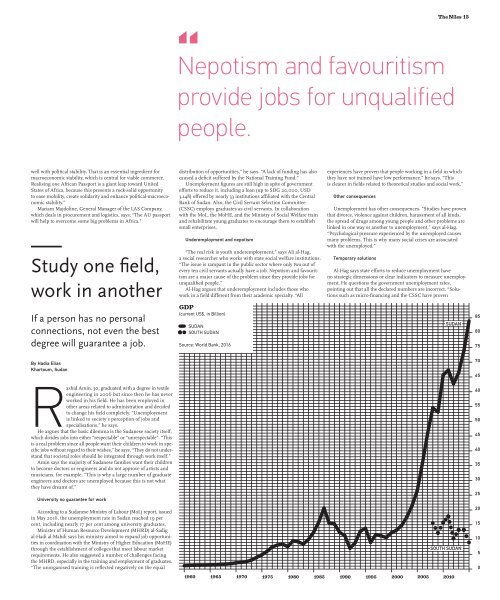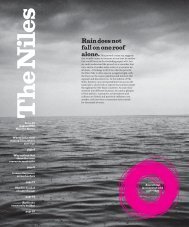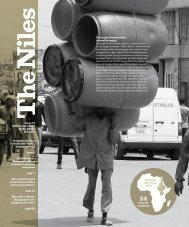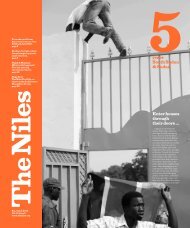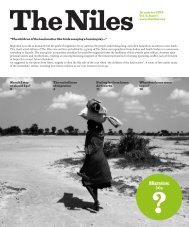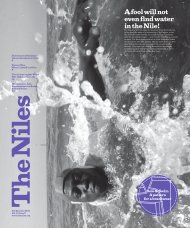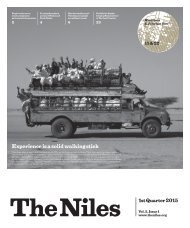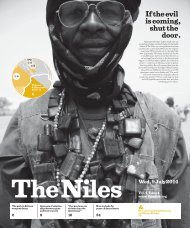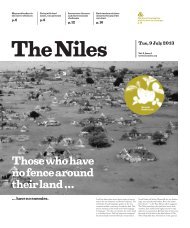Nobody has been sent to see...
Around 50 million people live in Sudan and South Sudan. They marry, they have children, they work – like the fisherwoman in this picture – they live in peace and they wage war against one another. But what awaits them in the future? Is it really as the Nuer proverb suggests, that no one knows what tomorrow brings? Some conflicts, experienced by both countries in the past years, were expected, some predictions could be drawn from past statistics. Correspondents from The Niles portrayed people from both countries through all stages of life and have briefly touched upon what it means to be Sudanese or South Sudanese.
Around 50 million people live in Sudan and South Sudan. They marry, they have children, they work – like the fisherwoman in this picture – they live in peace and they wage war against one another. But what awaits them in the future? Is it really as the Nuer proverb suggests, that no one knows what tomorrow brings? Some conflicts, experienced by both countries in the past years, were expected, some predictions could be drawn from past statistics. Correspondents from The Niles portrayed people from both countries through all stages of life and have briefly touched upon what it means to be Sudanese or South Sudanese.
You also want an ePaper? Increase the reach of your titles
YUMPU automatically turns print PDFs into web optimized ePapers that Google loves.
The Niles 15<br />
Nepotism and favouritism<br />
provide jobs for unqualified<br />
people.<br />
well with political stability. That is an es<strong>sent</strong>ial ingredient for<br />
macroeconomic stability, which is central for viable commerce.<br />
Realising one African Passport is a giant leap <strong>to</strong>ward United<br />
States of Africa, because this pre<strong>sent</strong>s a rock-solid opportunity<br />
<strong>to</strong> ease mobility, create solidarity and enhance political-macroeconomic<br />
stability.”<br />
Mariam Majdoline, General Manager of the LAS Company,<br />
which deals in procurement and logistics, says: “The AU passport<br />
will help <strong>to</strong> overcome some big problems in Africa.”<br />
Study one field,<br />
work in another<br />
distribution of opportunities,” he says. “A lack of funding <strong>has</strong> also<br />
caused a deficit suffered by the National Training Fund.”<br />
Unemployment figures are still high in spite of government<br />
efforts <strong>to</strong> reduce it, including a loan (up <strong>to</strong> SDG 20,000, USD<br />
3,148) offered by nearly 33 institutions affiliated with the Central<br />
Bank of Sudan. Also, the Civil Servant Selection Committee<br />
(CSSC) employs graduates as civil servants. In collaboration<br />
with the MoL, the MoHE, and the Ministry of Social Welfare train<br />
and rehabilitate young graduates <strong>to</strong> encourage them <strong>to</strong> establish<br />
small enterprises.<br />
Underemployment and nepotism<br />
“The real risk is youth underemployment,” says Ali al-Hag,<br />
a social researcher who works with state social welfare institutions.<br />
“The issue is rampant in the public sec<strong>to</strong>r where only two out of<br />
every ten civil servants actually have a job. Nepotism and favouritism<br />
are a major cause of the problem since they provide jobs for<br />
unqualified people.”<br />
Al-Hag argues that underemployment includes those who<br />
work in a field different from their academic specialty. “All<br />
experiences have proven that people working in a field in which<br />
they have not trained have low performance,” he says. “This<br />
is clearer in fields related <strong>to</strong> theoretical studies and social work.”<br />
Other consequences<br />
Unemployment <strong>has</strong> other consequences. “Studies have proven<br />
that divorce, violence against children, harassment of all kinds,<br />
the spread of drugs among young people and other problems are<br />
linked in one way or another <strong>to</strong> unemployment,” says al-Hag.<br />
“Psychological pressure experienced by the unemployed causes<br />
many problems. This is why many social crises are associated<br />
with the unemployed.”<br />
Temporary solutions<br />
Al-Hag says state efforts <strong>to</strong> reduce unemployment have<br />
no strategic dimensions or clear indica<strong>to</strong>rs <strong>to</strong> measure unemployment.<br />
He questions the government unemployment rates,<br />
pointing out that all the declared numbers are incorrect. “Solutions<br />
such as micro-financing and the CSSC have proven<br />
If a person <strong>has</strong> no personal<br />
connections, not even the best<br />
degree will guarantee a job.<br />
GDP<br />
(current US$, in Billion)<br />
SUDAN<br />
SOUTH SUDAN<br />
Source: World Bank, 2016<br />
SUDAN<br />
85<br />
80<br />
75<br />
By Hadia Elias<br />
Khar<strong>to</strong>um, Sudan<br />
70<br />
65<br />
Rashid Amin, 30, graduated with a degree in textile<br />
engineering in 2006 but since then he <strong>has</strong> never<br />
worked in his field. He <strong>has</strong> <strong>been</strong> employed in<br />
other areas related <strong>to</strong> administration and decided<br />
<strong>to</strong> change his field completely. “Unemployment<br />
is linked <strong>to</strong> society’s perception of jobs and<br />
specialisations,” he says.<br />
He argues that the basic dilemma is the Sudanese society itself,<br />
which divides jobs in<strong>to</strong> either “respectable” or “unrespectable”. “This<br />
is a real problem since all people want their children <strong>to</strong> work in specific<br />
jobs without regard <strong>to</strong> their wishes,” he says. “They do not understand<br />
that societal roles should be integrated through work itself.”<br />
Amin says the majority of Sudanese families want their children<br />
<strong>to</strong> become doc<strong>to</strong>rs or engineers and do not approve of artists and<br />
musicians, for example. “This is why a large number of graduate<br />
engineers and doc<strong>to</strong>rs are unemployed because this is not what<br />
they have dreamt of.”<br />
University no guarantee for work<br />
60<br />
55<br />
50<br />
45<br />
40<br />
35<br />
30<br />
25<br />
According <strong>to</strong> a Sudanese Ministry of Labour (MoL) report, issued<br />
in May 2016, the unemployment rate in Sudan reached 19 per<br />
cent, including nearly 17 per cent among university graduates.<br />
Minister of Human Resource Development (MHRD) al-Sadig<br />
al-Hadi al-Mahdi says his ministry aimed <strong>to</strong> expand job opportunities<br />
in coordination with the Ministry of Higher Education (MoHE)<br />
through the establishment of colleges that meet labour market<br />
requirements. He also suggested a number of challenges facing<br />
the MHRD, especially in the training and employment of graduates.<br />
“The unorganised training is reflected negatively on the equal<br />
SOUTH SUDAN<br />
20<br />
15<br />
10<br />
5<br />
0<br />
1960<br />
1965 1970 1975 1980 1985 1990 1995 2000 2005 2010<br />
tn9_20161207_cc2014.indd 15 2016/12/7 11:29


